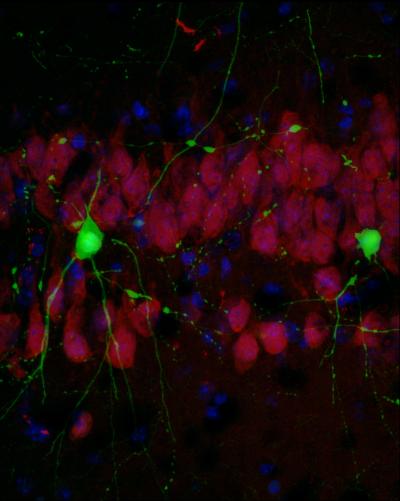Loss of memory in Alzheimer's mice models reversed through gene therapy

This image shows Crtc1 detection in mice neurons (in green). Credit: Universitat Autonoma de Barcelona
Alzheimer's disease is the first cause of dementia and affects some 400,000 people in Spain alone. However, no effective cure has yet been found. One of the reasons for this is the lack of knowledge on the cellular mechanisms which cause alterations in nerve transmissions and the loss of memory in the initial stages of the disease.
Researchers from the Institute of Neuroscience at the Universitat Autònoma de Barcelona have discovered the cellular mechanism involved in memory consolidation and were able to develop a gene therapy which reverses the loss of memory in mice models with initial stages of Alzheimer's disease.
The therapy consists in injecting into the hippocampus – a region of the brain essential to memory processing – a gene which causes the production of a protein blocked in patients with Alzheimer's, the “Crtc1” (CREB regulated transcription coactivator-1). The protein restored through gene therapy gives way to the signals needed to activate the genes involved in long-term memory consolidation.
To identify this protein, researchers compared gene expression in the hippocampus of healthy control mice with that of transgenic mice which had developed the disease. Through DNA microchips, they identified the genes (“transcriptome”) and the proteins (“proteome”) which expressed themselves in each of the mice in different phases of the disease.
Researchers observed that the set of genes involved in memory consolidation coincided with the genes regulating Crtc1, a protein which also controls genes related to the metabolism of glucose and to cancer. The alteration of this group of genes could cause memory loss in the initial stages of Alzheimer's disease.
In persons with the disease, the formation of amyloid plaque aggregates, a process known to cause the onset of Alzheimer's disease, prevents the Crtc1 protein from functioning correctly. “When the Crtc1 protein is altered, the genes responsible for the synapsis or connections between neurons in the hippocampus cannot be activated and the individual cannot perform memory tasks correctly”, explains Carlos Saura, researcher of the UAB Institute of Neuroscience and head of the research.
According to Saura, “this study opens up new perspectives on therapeutic prevention and treatment of Alzheimer's disease, given that we have demonstrated that a gene therapy which activates the Crtc1 protein is effective in preventing the loss of memory in lab mice”.
The research, published today as a featured article in The Journal of Neuroscience, the official journal of the US Society of Neuroscience, paves the way for a new therapeutic approach to the disease. One of the main challenges in finding a treatment for the disease in the future is the research and development of pharmacological therapies capable of activating the Crtc1 protein, with the aim of preventing, slowing down or reverting cognitive alterations in patients.
Media Contact
All latest news from the category: Life Sciences and Chemistry
Articles and reports from the Life Sciences and chemistry area deal with applied and basic research into modern biology, chemistry and human medicine.
Valuable information can be found on a range of life sciences fields including bacteriology, biochemistry, bionics, bioinformatics, biophysics, biotechnology, genetics, geobotany, human biology, marine biology, microbiology, molecular biology, cellular biology, zoology, bioinorganic chemistry, microchemistry and environmental chemistry.
Newest articles

Superradiant atoms could push the boundaries of how precisely time can be measured
Superradiant atoms can help us measure time more precisely than ever. In a new study, researchers from the University of Copenhagen present a new method for measuring the time interval,…

Ion thermoelectric conversion devices for near room temperature
The electrode sheet of the thermoelectric device consists of ionic hydrogel, which is sandwiched between the electrodes to form, and the Prussian blue on the electrode undergoes a redox reaction…

Zap Energy achieves 37-million-degree temperatures in a compact device
New publication reports record electron temperatures for a small-scale, sheared-flow-stabilized Z-pinch fusion device. In the nine decades since humans first produced fusion reactions, only a few fusion technologies have demonstrated…





















